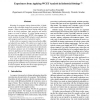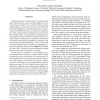117
click to vote
RTSS
2005
IEEE
15 years 8 months ago
2005
IEEE
Static timing analysis safely bounds worst-case execution times to determine if tasks can meet their deadlines in hard real-time systems. However, conventional timing analysis req...
105
click to vote
ISQED
2005
IEEE
15 years 8 months ago
2005
IEEE
This paper presents a two-step, RC-interconnect insensitive linear time-varying (LTV) driver model for gate-level timing calculation. We show how to characterize a driver with the...
99
Voted
DATE
2005
IEEE
15 years 8 months ago
2005
IEEE
Variability in process parameters is making accurate timing analysis of nano-scale integrated circuits an extremely challenging task. In this paper, we propose a new algorithm for...
126
Voted
SAC
2006
ACM
15 years 8 months ago
2006
ACM
: In chip design, one of the main objectives is to decrease its clock cycle; however, the existing approaches to timing analysis under uncertainty are based on fundamentally restri...
118
click to vote
ASPDAC
2006
ACM
15 years 8 months ago
2006
ACM
As technology scales down, timing verification of digital integrated circuits becomes an increasingly challenging task due to the gate and wire variability. Therefore, statistical...
146
click to vote
GLVLSI
2006
IEEE
15 years 8 months ago
2006
IEEE
Process technology and environment-induced variability of gates and wires in VLSI circuits make timing analyses of such circuits a challenging task. Process variation can have a s...
106
click to vote
DATE
2006
IEEE
15 years 8 months ago
2006
IEEE
This paper focuses on statistical interconnect timing analysis in a parameterized block-based statistical static timing analysis tool. In particular, a new framework for performin...
109
click to vote
ISORC
2007
IEEE
15 years 8 months ago
2007
IEEE
Knowing the program timing characteristics is fundamental to the successful design and execution of real-time systems. Today, measurement-based timing analysis tools such as in-ci...
165
click to vote
ECRTS
2007
IEEE
15 years 8 months ago
2007
IEEE
Of late, there has been a considerable interest in models, algorithms and methodologies specifically targeted towards designing hardware and software for streaming applications. ...
149
click to vote
RTAS
2008
IEEE
15 years 8 months ago
2008
IEEE
Embedded systems are often subject to constraints that require determinism to ensure that task deadlines are met. Such systems are referred to as real-time systems. Schedulability...




